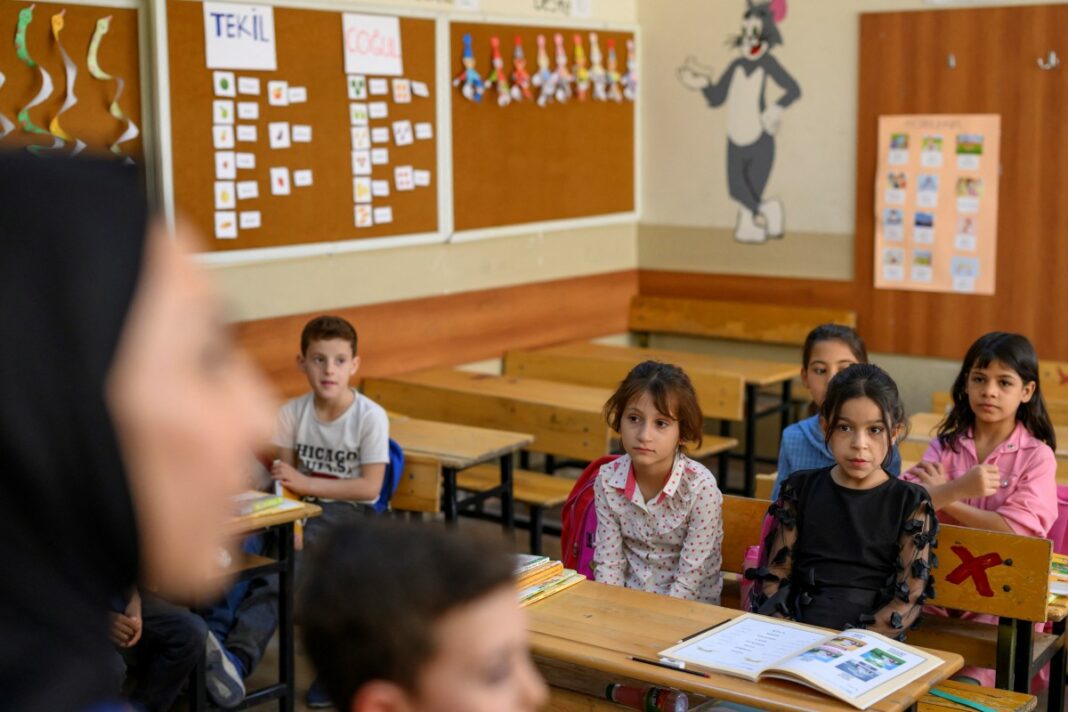The latest data from the Turkish migration authority shows that the population growth of Syrian children in the country is decreasing significantly, contradicting the far-right scaremongering about a “silent invasion” that would lead to Syrians outnumbering Turks in the future, according to a report by the Serbestiyet news website.
The notion of a “silent invasion” by Syrian refugees altering the demographic landscape of Turkey has been a persistent narrative among some far-right groups in the country.
Before Turkey’s general election in May 2023, a dystopian film titled “Silent Invasion” was aired on YouTube. The short movie is about a Turkish man who was born in 2011 and had studied to become a doctor, only to work as one of three Turkish janitors in a hospital owned by Syrians where even speaking Turkish is banned, in the year 2043 and in a Turkey where a Syrian candidate has been elected to govern the country’s largest city and commercial hub of İstanbul.
However, official data indicate that the Syrian child population in Turkey is decreasing rather than expanding, challenging these alarmist claims.
As of April 2024 the number of Syrian children aged 0-4 in Turkey stood at 408,164, a decrease from the 528,560 in the 5-9 age group, born between 2014 and 2019, suggesting a decline of 22.78 percent over five years. This trend is expected to continue as the birth rate among Syrian refugees in urban areas, where the vast majority reside, is falling more quickly than that of Turkish citizens.
The peak number of Syrians under temporary protection in Turkey was 3.7 million in 2021, but this figure has since dropped to 3.1 million due to individuals returning to Syria or moving to Europe. Even if no Syrians were to leave Turkey, their projected population would still not exceed 6 percent of the total national population in the future, according to the Serbestiyet report.
Data not only highlight the declining demographic influence of Syrian refugees but also mirror broader trends across Turkey where the overall fertility rate has been on a downward trajectory.
Turkey’s fertility rate has decreased to 1.51, significantly below the replacement level of 2.1, indicative of an aging population.
The Turkish Statistical Institute (TurkStat), however, does not regularly publish birth statistics specifically for the Syrian population, making precise calculations difficult. Nevertheless, the information available from the migration authority provides a glimpse of the demographic trends among Syrian refugees.
This decrease in the birth rate among Syrians is part of a global pattern where urbanization and stability lead to lower fertility rates. The claim of a demographic takeover by Syrians in Turkey, often referred to as the “silent invasion,” by far-right groups thus stands on shaky ground, with the latest statistics serving to debunk such theories further.
The discourse surrounding Syrian refugees in Turkey has been influenced by broader debates on migration and demographics in Europe and the United States, where similar unfounded claims of a “great replacement” have been propagated by far-right groups.
These narratives often overlook the diverse factors that influence demographic changes.
The living conditions of Syrian refugees in Turkey are increasingly precarious.
Human Rights Watch reported in March that the Turkish authorities are increasingly trying to deport Syrians, often forcing them to sign “voluntary” repatriation papers. In these deportations, refugees are usually sent to remote and unsafe regions in northern Syria, such as Tel Abyad, where they face serious humanitarian problems.
Many Syrians in Turkey live under the constant threat of deportation, exacerbating their vulnerability and limiting their access to stable employment and healthcare.
Turkey is party to the European Convention on Human Rights (ECHR), the International Covenant on Civil and Political Rights (ICCPR) and the 1951 Refugee Convention. As such, and as a matter of customary international law, it is obliged to respect the principle of non-refoulement, which forbids returning anyone to a location where they would face a real risk of persecution, torture or other cruel treatment, or a threat to their life. Turkish Law 6458 on Foreigners and International Protection (LFIP), enacted in April 2013, offers Syrians “temporary protection in Turkey, ensures their non-refoulement, and guarantees their stay until safety is established in their original countries.”
